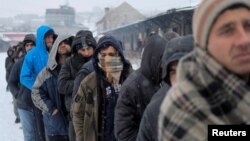Weather in Europe, which has seen sub-zero temperatures and heavy snowfall in areas, is threatening the lives of thousands of refugees and migrants, including more than 20,000 children, the U.N. children's fund said.
UNICEF estimates 23,700 refugee and migrant children, including infants and newborns, are stranded in Greece and the Balkans. It says many of the children, who mainly come from Syria, Iraq and Afghanistan, are living in unheated shelters that cannot protect them from the winter cold.
The International Organization for Migration reports several people already have died from hypothermia while making the treacherous Mediterranean Sea crossing into Europe.
UNICEF spokeswoman Sarah Crowe told VOA that people on land face other life-threatening illnesses.
"Like pneumonia, acute respiratory infections that are exacerbated in overcrowded conditions, and infants particularly do not have the kind of body fat that insulates them and, therefore, are more vulnerable," she said. "And pregnant women, of course, being — have a double vulnerability because it is their own health, plus the health of their unborn child."
UNICEF is calling on Greek authorities to move refugees and migrants currently living in overcrowded and underserviced camps on the islands to more appropriate accommodations.
Crowe said she is encouraged by recent efforts to bring people in from the cold and put them in heated hotels, hostels, and homes. She also said UNICEF winterization programs in Croatia, Serbia, Slovenia and Macedonia are helping women and children stay warm.
Nevertheless, she said many people on the Greek islands and in the Balkan states remain unprotected from the cold that is gripping Europe, where more than 20 people died during a particularly harsh streak of cold weather earlier this month.
Crowe warned it is only a matter of time before there are serious outbreaks of illnesses if more is not done to speed assistance to those in need across Europe.




